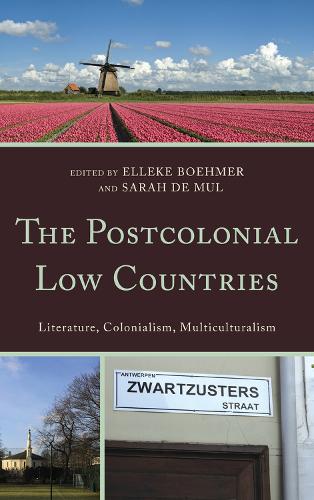
The Postcolonial Low Countries: Literature, Colonialism, and Multiculturalism
(Hardback)
Publishing Details
The Postcolonial Low Countries: Literature, Colonialism, and Multiculturalism
By (Author) Elleke Boehmer
Edited by Sarah De Mul
Contributions by Frances Gouda
Contributions by Theo Dhaen
Contributions by Sarah Bracke
Contributions by Nadia Fadil
Contributions by Isabel Hoving
Contributions by Pamela Pattynama
Contributions by Louise Viljoen
Contributions by Liesbeth Minnaard
Bloomsbury Publishing PLC
Lexington Books
31st May 2012
United States
Classifications
Tertiary Education
Non Fiction
Literary studies: postcolonial literature
Ethnic studies / Ethnicity
949.207
Physical Properties
Hardback
266
Width 161mm, Height 235mm, Spine 23mm
562g
Description
The Postcolonial Low Countries is the first book to bring together critical and comparative approaches to the emergent field of neerlandophone postcolonial studies. The collection of essays ranges across the cultures and literatures of the Netherlands and Belgium and establishes an encounter between postcolonial theoretical discourses from both within and without the region. Each one of the contributions puts under pressure the definitive concepts of postcolonial studies in its more conventional anglophone or francophone formation, as well as perceptions of the Low Countries, Belgium and the Netherlands, as lying outside or to the side of the postcolonial domain.
In the Low Countries, local and regional issues concerning multiculturalism and colonial belatedness have raised important questions about the possible grounds on which postcolonial critical concepts might be not only translated but also generated afresh, to suit these paradoxically new contexts. As The Postcolonial Low Countries incisively demonstrates, the Low Countries demand a careful rearticulation of such postcolonial readymades as hybridity, accommodation and creolization.
Gathering together contributions from both internationally renowned scholars and newly established researchers in the field, The Postcolonial Low Countries maps previously underexplored national and transnational literary critical trajectories. The book challenges in boundary shifting ways current readings of the so-described multicultural and postcolonial Netherlands and Belgium.
Reviews
In an era when many in the Netherlands and Belgium, in spite of their fiercely colonialist past, consider postcolonial thought 'outdated'another word for the sigh of relief at escaping the need to engage an object of resistancethis book couldnt be more timely. Postcolonizing the Low Countries is more necessary than ever. Smart, witty, and brave, the essays, sometimes tongue-in-cheek, offer an incisive critique of the reiteration of colonial clichs, the refusal to rethink the remnants of injustice, and the attempts to justify neonationalism. -- Mieke Bal, Professor Emerita in Literary Theory, University of Amsterdam
Finally, a postcolonial turn in Dutch literary criticism has taken place. The Postcolonial Low Countries is the first book to theorize and bring together approaches that can be called neerlandophone postcolonial studies. The need for such a perspective has been enormous, not only because of the colonial legacies of the Netherlands and Belgium but also because of the transnational formations through which the study of literatures in Dutch is currently being challenged. From now on, Dutch and Belgian literature can no longer be read the same. -- Ernst van Alphen, professor of literary studies at Leiden University
The Postcolonial Low Countries holds sparkling examples of boundary-pushing work. Intersecting postcolonial studies and multicultural critique this timely intervention is likely to unsettle neerlandophone literary establishments. -- Philomena Essed, Antioch University
Author Bio
Professor of World Literature in English at the University of Oxford, bilingual in Dutch and English, Elleke Boehmer is interested in the postcolonial debates that draw together Britain and the Netherlands. She is the author of four acclaimed novels, Screens again the Sky (short-listed David Hyam Prize, 1990), An Immaculate Figure (1993), Bloodlines (short-listed SANLAM award, 2000), and Nile Baby (2008), as well as the short-story collection Sharmilla and Other Portraits (2010). Her other books include Colonial and Postcolonial Literature (1995, 2005), Empire, the National and the Postcolonial, 1890-1920 (2002), Stories of Women (2005), and the biography Nelson Mandela (2008). She edited Robert Baden-Powells Scouting for Boys (2004), and the anthology Empire Writing (1998), and co-edited JM Coetzee in Writing and Theory (2009), Terror and the Postcolonial (2009), and The Indian Postcolonial (2010). She is currently working on a memoir fiction part set in the Netherlands.
Sarah De Mul received her PhD at the University of Amsterdam and previously held a NWO Rubicon fellowship at the University of Leiden. She is currently FWO-Postdoctoral Fellow at K. U. Leuven University and Lecturer at the Open University the Netherlands. De Mul wrote a study of colonialism and memory in contemporary womens travel writing (Colonial Memory, Amsterdam University Press, 2011) and a Dutch-languagemonograph on multiculturalism in Flanders Een leeuw in een kooi. (Meulenhoff-Manteau, 2009, together with K. Arnhaut, S. Bracke, B. Ceuppens, N. Fadil; M. Kanmaz). She is co-editor of Commitment and Complicity in Cultural Theory and Practice (Palgrave Macmillan, 2009, with B. O. Firat and S. van Wichelen) and Literature, Language, and Multiculturalism in Scandinavia and the Low Countries (Amsterdam/New York: Rodopi, 2012, with W. Behschnitt and L. Minnaard). Her publications and research interests are situated in the field of comparative postcolonial studies with a particular focus on literatures in Dutch and English. Her current projects explore postcolonialism and transnationalism in the Low Countries, migrant writing in Flanders and European (colonial) writing about Africa/the Congo during the fin de sicle.
